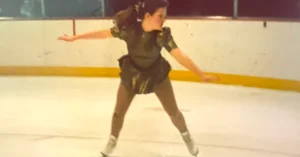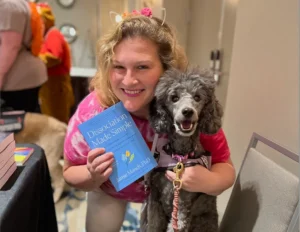DISCLAIMER: I write this from a perspective shaped by both privilege and adversity. I’ve benefited from access to education and hold a professional title that carries weight in clinical spaces. These aspects of my identity afford me certain advantages, and I acknowledge that they influence how I see and speak about the world. At the same time, my life has included significant hardship, experiences that have shaped my understanding of neurodivergence and mental health. While this reflection is grounded in my own lived experience and clinical work, I recognize that it does not speak for all neurodivergent voices. I offer these thoughts with humility, knowing that others may hold different truths, and I share them in the hope of fostering open, respectful dialogue.
Recently, I participated in a professional event centered around neurodiversity. I was excited – this is a space I care deeply about, both professionally and personally. Over the years, I’ve worked with individuals navigating complex mental health and neurodivergent experiences. Having my neurodivergence confirmed in adulthood, I understand the relief and clarity that can come from making sense of one’s own mind.
What I didn’t expect was to feel like an outsider in a room that claimed to fight othering. And this wasn’t the first time. At a previous neuro‑affirming gathering, where I expressed similar sentiments about affirmation and agency, I was met with a comparable response. And yet, despite years of working in this space, what happened next surprised me. This sense of exclusion, despite shared values, prompted deeper reflection on the dynamics at play in advocacy spaces.
When Advocacy Becomes an Echo Chamber
During a recent professional discussion within a neurodiversity-affirming context, I offered what I hoped would be a balanced perspective: that affirming neurodivergent identities is essential, and so too is supporting individuals to draw on their strengths, autonomy, and agency. My intention was to say: “Yes, the world is often unjust and disabling”, and, “yes, you have strengths that can help you navigate it and thrive”.
I spoke about responsibility, not as a burden, but as a pathway to empowerment. My intention was to acknowledge both the injustices and disabling aspects of the world, as well as the unique strengths that can help individuals navigate and thrive within it. How do we bridge the gap between the often harsh realities of society and the aspiration for neurodivergent individuals to feel genuinely safe, validated, and understood within it?
A courageous blog post written by Dr. Jamie Marich (Link) on accountability and growth in her own recovery journey deeply resonated with me and further encapsulated my intention. As Dr Jamie powerfully articulates in her writing, healing is ultimately an act of reclaiming agency, independent of whether others acknowledge past harms.
The response, however, was unexpectedly swift and dismissive. Rather than encountering open disagreement or curiosity, I felt the conversation was closed off before it truly began. The absence of psychological safety and openness to nuance was striking.
In reflecting on this, I recognize that my language could have been more explicitly neuro-affirming. At the same time, it’s important to acknowledge that even well-intentioned language choices, such as the use of person-first or identity-first language, are not universally experienced as affirming. For example, while some individuals prefer to be described as “a person with autism,” others strongly identify as “autistic.” Expecting everyone to use a single form of language can inadvertently undermine inclusion by disregarding personal preference. True affirmation means respecting and honoring how each person wishes to identify, rather than imposing a one-size-fits-all approach.
This experience highlighted deeper dynamics within advocacy spaces, particularly the tension between inclusion and rigidity.
The Blind Spots We Need to See
This experience underscored a tension that can arise within advocacy spaces: the risk of echo chambers. Movements often begin with a powerful mission to dismantle oppression and promote justice, but may, over time, develop rigid expectations around language and ideology. When dialogue becomes overly prescriptive, there is a risk of unintentionally excluding those who are still learning or who bring diverse, valuable perspectives. This can alienate potential allies and foster environments where only certain voices are amplified. Occasionally, prominent figures may dominate the narrative, shifting the focus from collaboration to self-promotion.
When advocacy loses sight of inclusion and humility, it risks becoming performative rather than transformative, and sometimes, even well‑intentioned efforts can miss the mark in more subtle ways, what Dr. Praslova and others have called benevolent ableism.
Benevolent Ableism: The Subtle Trap
In clinical practice, benevolent ableism refers to well-intentioned attitudes that inadvertently reinforce the idea that neurodivergent individuals need to be ‘fixed’—often centering neurotypical norms as the ideal. Yet, it can also manifest as a rigid insistence that all adaptation or skill-building is inherently oppressive, or as an exclusive focus on societal barriers that reinforces helplessness and neglects the development of agency, coping strategies, or adaptive skills. While it is vital to acknowledge injustice, true affirmation means empowering individuals to define and pursue their own goals—even within a world that may not always change quickly enough. In both cases, the result is a failure to honor personal agency. Similar dynamics can emerge in advocacy spaces, where clinicians may be broadly labelled as oppressive, or neurodivergent individuals are infantilized by having their autonomy overlooked.
Genuine affirmation isn’t about removing responsibility. It’s about redefining it: Not “try harder to be like everyone else,” but rather, “you have strengths and choices—how can we support you to thrive on your own terms?”
What Can Benevolent Ableism Look Like in Clinical Practice?
Over‑Accommodating Avoidance (Telehealth Close to Clinic):
A patient requests indefinite telehealth sessions due to discomfort leaving home. The clinician, aiming to be supportive, agrees without exploring gradual steps toward in-person engagement. Compassion is essential, but unexamined accommodations can entrench avoidance. Collaborative planning respects autonomy while supporting growth.
Dismissing a Patient’s Desire for Change:
When a neurodivergent client expresses a wish to develop certain social skills or coping strategies for their own reasons (such as wanting to feel more comfortable at work or in relationships), the therapist might respond, “We don’t do that here; you shouldn’t have to change for anyone.” This can invalidate the client’s agency and personal goals.
“Rescuing” Rather Than Collaborating:
A clinician steps in to advocate for a patient in every setting, rather than supporting the patient to develop self-advocacy skills, which can reinforce dependency.
Rejecting All Forms of Intervention as ‘Masking’:
Automatically labelling any interest in adaptation or skill-building as “masking” or “internalized ableism,” rather than exploring the client’s motivations and values, can deny them the right to self-determination.
Assuming Shared Experience = Shared Perspective:
A clinician shares their own coping strategy, suggesting the patient should adopt it, without considering individual differences.
What Rutger Bregman Taught Me About Movements
In his book Moral Ambition, Rutger Bregman argues that real change comes from people who combine idealism with ambition; those who don’t just dream of a better world but build it. Social movements succeed when they welcome diverse voices, not just the loudest ones. Frame their cause as a moral imperative without turning it into a moral hierarchy. Avoid wasting talent by creating spaces where everyone – clinicians, advocates, lived‑experience leaders – can contribute meaningfully.
‘You don’t do good things because you are a good person. You become a good person by doing good things.’ — Rutger Bregman, Moral Ambition.
The neurodiversity movement has this potential. But only if we resist the pull of echo chambers and personality cults. Because this isn’t just about therapy rooms or conferences, it’s about society.
Neurodiversity as a Societal Movement
The neurodiversity-affirming movement is not just a clinical or academic trend; it is a societal movement, akin to gender equality, racial justice, and LGBTQ+ rights. It calls for a fundamental shift in how we understand, accommodate, and celebrate neurological differences.
Like the civil rights and gender equality movements, neurodiversity advocacy seeks systemic change. This includes reforming education, workplace policies, healthcare systems, and public attitudes to ensure that neurodivergent individuals are not just included, but empowered.
But how we pursue this change matters. We must resist the temptation to create echo chambers or purity tests. Instead, we need to build coalitions between clinicians, advocates, educators, employers, and neurodivergent individuals themselves. We need to foster environments where disagreement is met with curiosity, not condemnation.
What we can do:
- Promoting psychologically safe spaces for dialogue across disciplines and identities.
- Encouraging inclusive language change through education, not shame.
- Supporting neurodivergent leadership that models accountability and growth.
- Advocating for policy reforms that reflect neurodiversity as a human rights issue.
- Ensuring that lived experience and clinical expertise inform each other, not compete.
This is how we build a movement that lasts, one that transforms systems without losing its soul. And while these challenges are real, I also want to acknowledge the bright spots.
Gratitude for Colleagues Who Showed Up
I also want to say this clearly: I want to acknowledge the support of colleagues who engaged in good faith, listened, and modelled compassion, curiosity, and collaboration. Their presence reminded me that there is a center of gravity in our field that values these qualities over point-scoring. Those moments of support reminded me why nuance matters.
A Call for Nuance and Compassion
Here’s what I believe: Language matters, but shaming people into change rarely works. Invite, don’t vilify. Lived experience matters, but so does clinical expertise. Affirmation matters; so does agency. We can validate pain and still nurture resilience. If we truly want a neurodiversity‑affirming world, we need dialogue, not dogma. Curiosity, not condemnation. Collaboration, not competition.
And yet, saying this out loud isn’t without risk.
On Taking the Risk to Say This Out Loud
I am aware that sharing these reflections carries risk. Speaking candidly about echo chambers and benevolent ableism within neurodiversity-affirming spaces may challenge prevailing narratives and is not without potential consequences. My intention is not to provoke, but to contribute thoughtfully to a movement I care deeply about—one that can live up to its promise for both those seeking support and those providing it. I recognize that raising these issues may lead to discomfort or even exclusion from certain circles. For these reasons, this post is written anonymously. I share these thoughts in the hope that they invite genuine dialogue, not division.
Where Do We Go From Here?
This movement is powerful. It has the potential to reshape how we see difference, how we build systems, and how we treat one another. But only if we choose dialogue over dogma, compassion over condemnation, and curiosity over control.
Let’s create a world that not only includes neurodivergent people, but truly empowers them. This blog is written not to divide, but to invite conversation about building a more balanced, inclusive, and sustainable path forward.
Because if we can’t model inclusion within our own movement, how can we expect the world to follow?
Warmly,
Anon. E. Mows





One Response
What a spicy and thoughtful message! I (as a ND affirming clinician who is ND) think these are points everyone should be embracing regardless of context. It feels especially hard to swallow your statement about benevolent ableism under: “Over‑Accommodating Avoidance;” however, this is not a new idea, clinicians should have been considering this with any exception to rules. On the other hand, it does feel wrong to assert: a) in-person therapy is going to be more effective than telehealth for all people, and b) even if that is the case, it is better to be a person who can tolerate in-person therapy.
I do not mean to say these points of mine negate your overall message–it is a well written piece and valid to its core. I am sorry you had an exclusionary experience in a setting that was intended to be the opposite. This movement is SO NEW and RAPIDLY GROWING that it is going to have these growing pains, and my hope is that ultimately we as a community and a larger culture we can find a middle ground to build equitable practices on.
Two personal experiences come to mind. The first is learning this summer that my nephew is beginning an advanced degree certification in ABA (yikes). The second is when, in 2017, I attended a brief talk on therapy with clients who were diagnosed with Autism. The therapist said “I don’t let them end the session early–I explain this is what the insurance company says you must do. They need to learn to stay.” She was referring to people with relatively high levels of symptoms and needs for support. I am paraphrasing of course, but I left that session shocked and nearly feeling a need to report abuse! I had the opposite strategy. I wanted to empower my Autistic clients and for them to have a choice. I hope that person has changed her methods, but I do believe there is a LOT of catching up to do from many sectors in this area. Kudos to you for starting a conversation here!